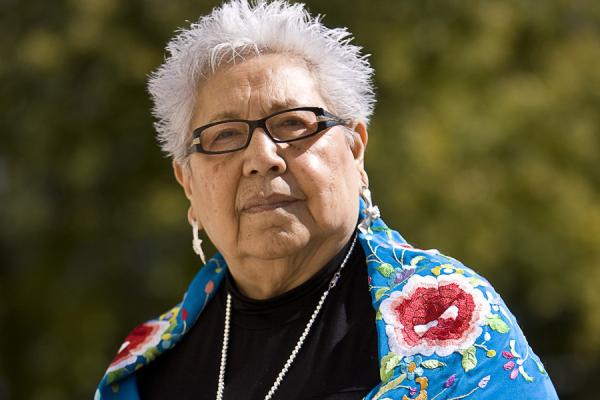Henrietta Mann
National Humanities Medal
2021

—Photo courtesy of Henrietta Mann

—Photo courtesy of Henrietta Mann
WHITE HOUSE CITATION
Henrietta Mann, for dedicating her life to strengthening and developing Native American education. The pioneering efforts of Henrietta, Ho’oesto’oona'e, Mann, led to programs and institutions across the country devoted to the study of Native American history and culture, honoring ancestors that came before and benefiting generations that follow.
Henrietta Mann is a full-blood Cheyenne, an elder of her people, and a citizen of the Cheyenne-Arapaho Tribes of Oklahoma. She is a celebrated educator, a professor of Native American studies, and a leading figure in the development of programs devoted to Native American studies. “Henri,” as she is known to her friends, is something else as well. She is the kind of person who when she speaks—slowly, directly, and with mounting force, calling on her long memory as a person and a Cheyenne—stops you in your tracks and makes you listen very closely.
She received her PhD from the University of New Mexico, writing a dissertation on the history of Cheyenne-Arapaho education. Finding a way to train as a scholar of Native American culture, though, took persistence. As she told NEH Chair Shelly C. Lowe (Navajo) in an interview in Humanities magazine:
While I was working on my master’s thesis, I wanted to write about Indians. I was working toward my second degree in English. And so I proposed this to my adviser, and was told, no, you can’t. You can’t study about your oral traditions. . . . It boiled down to, well, there’s no one here to evaluate what you would write about.
She ended up writing a master’s thesis on bird imagery in Jane Eyre, then finally turned to Native American history, in a career full of unexpected turns.
Mann taught junior high and high school, then, in the spring of 1970, went on to teach at the University of California, Berkeley. In an oral history, she recalled walking into her first class and seeing no Native students. She quickly learned they were all protesting at Alcatraz, where Native American activists were attempting to reclaim the unused island, its famous prison having closed a few years earlier.
It was a heady time for Native American education. In 1969, Senator Ted Kennedy issued a special subcommittee report calling Indian education “a national tragedy” and “a national challenge.” Berkeley was one of the schools where a new direction was taking shape, in which higher education would become an important vehicle for Native self-determination. The development of courses in Native American studies was one part of the story. The other part was institutional. In 1968, the first tribal college, Navajo Community College (now Diné College), was founded in Arizona, the beginning of a movement that would result in the founding of more than 40 other tribal colleges in the coming decades.
“We have to provide an environment for our young people,” Mann told Humanities magazine, “that is consistent with who they are, so that they can take courses in American Indian history, culture, language, philosophy, spirituality, literature, our oral traditions, our stories, which hold so much of our history and culture within them.”
After Berkeley, Mann became an assistant professor of Native American studies at the University of Montana, Missoula, where she would eventually direct the program in Native American studies. Beginning in 1986, she worked at the Bureau of Indian Affairs, where she became the first Indian woman to direct Indian education programs. She then returned to teaching and a few years later was ranked as one of the top ten college professors in the country by Rolling Stone magazine.
As a child, Mann says, she loved school but realized she wanted to be a teacher after she and her Native classmates had been subjected to a barrage of racist harassment on the school bus. As she told Chair Lowe, “I never ever wanted Indian children to be treated the way that I had seen us treated that day.”
During sabbaticals from the University of Montana, Mann helped develop Native American studies at various schools, just as she did starting in 1993 at Haskell Indian Nations University in Lawrence, Kansas.
In 2000, Mann, by now a much-lauded educator and scholar, became the first person to hold the Katz Endowed Chair in Native American Studies at Montana State University, Bozeman. A few years later, when the Cheyenne-Arapaho government decided to build their own tribal college, she became the founding president.
She is also a widely acclaimed speaker on Native American education. But when she speaks about her own life, her family, and Cheyenne history, including such tragic episodes as the Sand Creek Massacre, you realize that, along the way, Henrietta Mann has been educating all of us, Native and non-Native alike.
—David Skinner